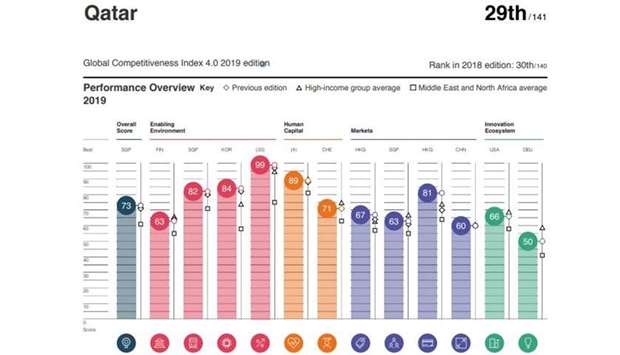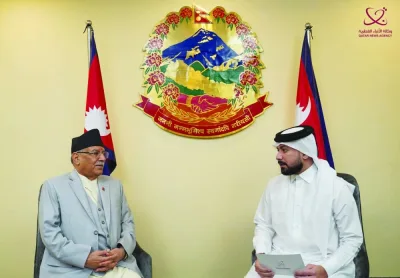Qatar was ranked 29th globally and second in the Arab world, according to the Global Competitiveness Report 2019, published annually by the World Economic Forum (WEF), in collaboration with the Qatari Businessmen Association (QBA) and Qatar University’s Social and Economic Survey Research Institute (Sesri).
The report indicated that Qatar ranked 29th worldwide and second in the Arab world out of the 141 countries assessed this year, up one rank from last year’s 30th place , reflecting Qatar’s continued global competitiveness.
Qatar has preceded several countries in the region, including Saudi Arabia, which ranked 36th place, Bahrain (45th), Italy, Turkey, Russia, India, Poland, and Argentina, most of which belong to the G20 group as the world’s largest economy.
Oman witnessed a decline of six ranks to place 53rd, while Kuwait showed “remarkable progress” of eight ranks to reach 46th, as well as Egypt placed 93rd this year, up one notch from 2018.
Qatar is also leading in many indicators, according to a statement from the QBA. The report’s 12 main pillars that assess the status of the economy are divided between institutions, infrastructure, ICT adoption, macroeconomic stability, health, skills, product market, labour market, financial system, market size, business dynamism, and innovative capability.
In areas where Qatar achieved international top ranks, the country was placed first in the Arab world and among the top 10 countries globally in many indicators.
For example, in the Institutional Pillar, Qatar moved two ranks up from last year to reach the seventh globally in the ‘Efficiency of the Legal Framework in Challenging Regulations’ indicator and ranked sixth in the ‘Government’s Responsiveness to Change’, and also ranked eighth in the ‘Government Long Term Vision’.
As for the ICT Adoption Pillar, Qatar remains among the top 10 economies globally, ranking eighth. Qatar is also the first globally in the ‘Internet User’ indicator. In the ‘Skills Pillar’, Qatar ranked eighth globally in the ‘Skillset of Graduates’ indicator and third in the ‘Ease of Finding Skilled Employees’ indicator, and sixth in the ‘Skills of Future Workforce’. In the ‘Financial System Pillar’, Qatar ranked fourth globally in the ‘Financing of SMEs’ indicator and fifth in the ‘Venture Capital Availability’.
In addition to 23 indicators, Qatar ranked 10th and 20th globally in terms of property rights, public sector performance, quality of infrastructure in transport in terms of road connectivity, quality of roads, efficiency of air transport services, and efficiency of seaport services, as well as in the ICT services, skills of current workforce, quality of vocational training, domestic competition, entrepreneurial culture, and growth of innovative companies.
Qatar has preceded several countries in the region, including Saudi Arabia, which ranked 36th place, Bahrain (45th), Italy, Turkey, Russia, India, Poland, and Argentina, most of which belong to the G20 group as the world’s largest economy.
Oman witnessed a decline of six ranks to place 53rd, while Kuwait showed “remarkable progress” of eight ranks to reach 46th, as well as Egypt placed 93rd this year, up one notch from 2018.
Qatar is also leading in many indicators, according to a statement from the QBA. The report’s 12 main pillars that assess the status of the economy are divided between institutions, infrastructure, ICT adoption, macroeconomic stability, health, skills, product market, labour market, financial system, market size, business dynamism, and innovative capability.
In areas where Qatar achieved international top ranks, the country was placed first in the Arab world and among the top 10 countries globally in many indicators.
For example, in the Institutional Pillar, Qatar moved two ranks up from last year to reach the seventh globally in the ‘Efficiency of the Legal Framework in Challenging Regulations’ indicator and ranked sixth in the ‘Government’s Responsiveness to Change’, and also ranked eighth in the ‘Government Long Term Vision’.
As for the ICT Adoption Pillar, Qatar remains among the top 10 economies globally, ranking eighth. Qatar is also the first globally in the ‘Internet User’ indicator. In the ‘Skills Pillar’, Qatar ranked eighth globally in the ‘Skillset of Graduates’ indicator and third in the ‘Ease of Finding Skilled Employees’ indicator, and sixth in the ‘Skills of Future Workforce’. In the ‘Financial System Pillar’, Qatar ranked fourth globally in the ‘Financing of SMEs’ indicator and fifth in the ‘Venture Capital Availability’.
In addition to 23 indicators, Qatar ranked 10th and 20th globally in terms of property rights, public sector performance, quality of infrastructure in transport in terms of road connectivity, quality of roads, efficiency of air transport services, and efficiency of seaport services, as well as in the ICT services, skills of current workforce, quality of vocational training, domestic competition, entrepreneurial culture, and growth of innovative companies.



